QuestionQUESTION: I have three Ferrets at home. My home is ferret-proof. My oldest child was nice and fat one week and the following week she dropped a lot of weight. She had stopped eating dry food and drinking very little water. At first I thought she was being a brat because we just got a boy a month ago. We started force feeding her beef flavored baby food the get some weight on. She started drinking again and we have been feeding her baby food for a week now. How should I approach getting her back on regular food? (I feed my Ferrets a well balanced Cat food by Iams) Also she has become bitey over the last year ever since we got the second Ferret child. She bites every human who comes in my house. Only the ones who put her in her place and doesn't take her crap she doesn't bite. Let me know what y'all think. Thanks
ANSWER: Hi Todd:
I'm sorry to hear about your sick little one. You're describing exactly how nearly every owner notices finds out their ferret is not well; weight loss - and it's often pretty significant before we realize they aren't eating right! Fortunately you were paying attention and caught her early enough to turn it around...although we still don't know why she wasn't eating, so keep in mind that she may have an underlying problem that causes her not to want to eat.
Ferrets are very emotional critters and often get greatly upset when a new ferret joins the family - especially if they have previously been an only ferret. Basically she is annoyed at them because she has to share your love with them :-/ Sometimes, if a bacteria called 'heliobacter mustelae' is present in their system at the same time they are having emotional upset, the ferret will get a stomach ulcer or gastritis. You can read more detailed information here:
http://www.ferretcentral.org/faq/med/ulcers.html
Simply removing the stress or forcing the ferret to eat will *not* cure the problem, but it will keep your ferret strong enough long enough to get medications from your vet to heal the ulceration. Usually several antibiotics are given, in addition to Pepcid A/C or Tagamet. It takes the stomach a while to heal, so you get really tired of giving meds by the time they are healed, but they do recover completely and should start feeling better pretty soon after the antibiotics and ulcer medication are started.
Now, about this brattiness LOL. Every time a new ferret is introduced into the home, the existing ferrets and the new ferret have to determine who is the "alpha" ferret. She may be extremely stressed since you brought that first new baby home...and probably suffering from an ulcer since then (which would account for some of her brattiness). When ferrets don't feel well, they get cranky, just like we do.
I just wanted to mention to you also that the ONLY Iams food that is sufficient for ferrets is the KITTEN CHOW in the purple bag. The adult cat formula just doesn't meet their nutritional needs. I think you will find, overall, that you may pay more in buying a food like Totally Ferret, but your vet bills will be less. I think what we feed our ferrets absolutely determines the state of their health. Here is a great food comparison chart:
http://www.mdferretpaws.org/care/food_treats.html
If you do continue to have problems with her eating (you probably will until that ulcer gets treated), a better food to feed her is Hill's A/D Feline (canned). I use about a tablespoonful in a little custard cup and add a couple tablespoons of water, put in the microwave for about 12 seconds, stir until smooth and about the consistence of gravy. Dip your finger in it and let the ferret eat off your finger if she doesn't take to it right away. Ferrets never seem to like new foods, as they imprint on their foods early in life, so any change should always be made little by little, increasing the new food and decreasing the old, until they are completely changed over to the new food. Hill's A/D can be purchased only at your vets office, so just remember to pick some up when you take her in. It will help keep more weight on her and is made specifically for stomach problems, so it is very easily digested and has all the nutrients she needs to stay as comfortable as possible until her tummy heals up. Hopefully you are feeding her all she will eat at least four times a day.
I feel quite strongly that, due to the timing of her crankiness, that it is very likely that she has a stomach ulcer and is in pain, which will make her 'bitey'. Other symptoms *may* be pawing at the roof of her mouth, drooling,and intermittent loose stools. Tarry black stools mean the ulcer is bleeding. She may have all or none of these symptoms. Try to get her in to a good ferret as soon as possible. A quick blood test will determine if she has the helicobacter bacteria in her system. Meanwhile, you should definitely keep her on some kind of soft food, as her tummy no doubt hurts worse when she eats hard food.
Just in case you need a ferret-specific vet (all dog and cat vets are not necessarily ferret vets - ask if they specialize in 'exotics'; if they say 'yes', you have a ferret vet. Here's the list in case you need it - it's made up of vets recommended by other ferret owners:
VETS CANADA:
* http://www.ferretrescue.ca/start.php
* http://tinylink.com/?TlVyYKa6e0
* http://www.ferrets.org/Veterinarian_Listings.htm (British Columbia)
* http://www.ferretcentral.org/for-others/db-vets.html
VETS USA:
* http://www.quincyweb.net/quincy/vet.html
* http://ferrethealth.org/vets/
* http://www.ferret-universe.com/vets/vetlist.asp
* http://www.ferretsanctuary.com/vets.shtml
* http://www.ferretcentral.org/for-others/db-vets.html
* http://ferrethealth.org/vets/
VETS UK & IRELAND:
* http://homepage.ntlworld.com/ferreter/vetlist.htm
VET INFO/ LIST OF FERRET GROUPS/ CONTACTS IN UK, ITALY, NEW ZEALAND, AUSTRALIA, NETHERLANDS, GERMANY & DENMARK:
* http://www.ferretcentral.org/for-others/db-overseas.html (scroll down page to find the one you are looking for)
Thanks for an excellent question! No doubt others will read your question and recognize the same symptoms in their ferret. Although helicobacter is incredibly common in ferrets, it often goes untreated until the ferret has internal bleeding that can be life-threatening. There are ferrets out there with tummyaches that can't speak for themselves - thanks!
Sincerely,
Jacquie Rodgers
---------- FOLLOW-UP ----------
QUESTION: My middle Ferret, Age 2 yrs, Female. Is looking a little thin in her chest area. I can feel her spine and shoulder bones. The odd thing is her belly is plump. And she is eating and poo-ing regularly. Any thoughts?
AnswerHi Todd:
Yes - I think the answer may lie in your previous question, actually. If you've been feeding Iams "Cat" food instead of Kitten food, the ferret is possibly malnourished. There is a lot of difference in the two and the kitten chow is healthier for ferrets. It does meet a ferrets nutritional needs, but just BARELY. A premium ferret food will generally keep your ferrets feeling better and healthier. It's well worth the few dollars extra, as it saves in vet bills in the long run.
Just like people, they can eat "junk" food for a while, but eventualy they will end up being malnourished and/or ill because they are just not receiving all the nutrients a ferret requires.
I would strongly recommend a good, premium food like Totally Ferret. You will have trouble getting them changed over now, so you must do it slowly. First start by putting half a dozen Totally Ferret kibbles in their regular bowl of food and give Totally Ferret to them as a treat so they think it is something really special. They will probably not like it in the beginning. Ferrets "imprint" on their food early in life, so they will resist *any* change in food. Totally Ferret is really good for them and I haven't met a ferret yet who doesn't love it, so it will be the easiest to get them on and also the best as far as being complete in nutrients.
Add Totally Ferret to the bag of Iams so the flavors have a chance to blend - shake the bag to mix well. Each time you increase the amount of Totally Ferret in the bowl (and in the bag),and shake well. This blending of flavors in the bag will help the ferrets change over to the new food.
Slowly, each time you add food to the food bowl, you will need to add more Totally Ferret to the bag of Iams. Within several weeks you should be feeding all Totally Ferret and hopefully all of them will be eating it without too much protest. It does take persistence, but they *can* change over...just do it slowly.
The most urgent concern I have is that there is also a possibility your little girl has a hairball blockage in her intestines. A blockage (hairball or other item) would cause a major weight loss. She may not be eating, or may be eating a lot less than normal. The best way to see if she is eating is to put her into another cage by herself. Count the kibbles you put in her food bowl and then count them again after 8 or 10 hours. If she hasn't touched them, you have the answer to your question and you will need to get her in to see the vet right away.
The vet can palpate her tummy (feel inside), and do an ultrasound or xray to see if there is a blockage. They do NOT always show on xray, but sometimes do show OR show where the intestines are pinched off, so it's worth trying.
You definitely need to rule out this possibility ASAP, as it's the one that will kill her fast. Don't hesitate - get her in for xray and exam right away (I'd do it even before the 8-10 hour food test if it were me, just to be safe).
Once you have ruled out an intestinal blockage you can feed her some Hill's A/D with water added until it is gravy consistency, and warmed till it's comfortably warm when dripped on the inside of your elbow area. You should feed her the A/D 'soup' at least 3 - and it's better if you do it 4 - times a day, as much as she will eat. A ferret who is eating well should eat nearly a full can of A/D a day (just to give you an idea of how much to feed).
Do this for 3 or 4 days to get her strength back up, then you can attempt to put her back on her normal kibble (count them so you know if she is eating) again.
The things I need to stress are that you need to eliminate the possibility of an intestinal blockage before you do anything else at all. THEN, concentrate on getting some nutrition in her for several days in a row, then start getting her back on kibble again. Hopefully she will go back on it without incident, but try to do the 'soup' feedings for only a couple of days because it is hard to get them back on kibble once they are used to soup and the extra attention that brings.
If she still won't eat kibble after you get the test for a blockage and a few days of eating soup, you will need to consider other illnesses she could have. Those possibilities could be anything from an ulcer in her tummy to adrenal disease (usually they have fur loss with adrenal, but they also have loss of muscle tone and an enlarged tummy also). It's just important to eliminate the things that can kill her right away; then get some nutrition in her, THEN worry about other possibilities.
Your vet will be your best guide, as he is there to examine her physically and run a blood panel in order to eliminate some other things that could be wrong. Unfortunately we can lose these kids SO fast once they stop eating. It's imperative that you keep fluids in her starting immediately, even if she's not eating today. Pedialyte is a good thing for them and you can even give it with an eyedropper or syringe (with needle removed) if she won't drink it on her own. My kids love the grape and bubblegum flavored pedialyte and drink it on their own. She needs to get as much fluid down as she can. Even if she's not eating, the fluids will keep her alive for 24 hours until you can get her to a vet to eliminate the possibility of an intestinal blockage.
Please don't hesitate to write again if I can help. PLEASE do get her to the vet as soon as you possibly can though. There is no way to know if she has a blockage without a complete exam by your vet and you absolutely don't want to force feed her if she has a blockage.
My thoughts and prayers are with your little one. Sounds like you're getting a little hospital going there. It seems like when one gets sick, they all do - kind of like real kids LOL. This too shall pass...really it will :-) It sounds like they are in great hands, Todd, and you really are a good daddy. Lucky little ferrets!
Sincerely,
Jacquie Rodgers

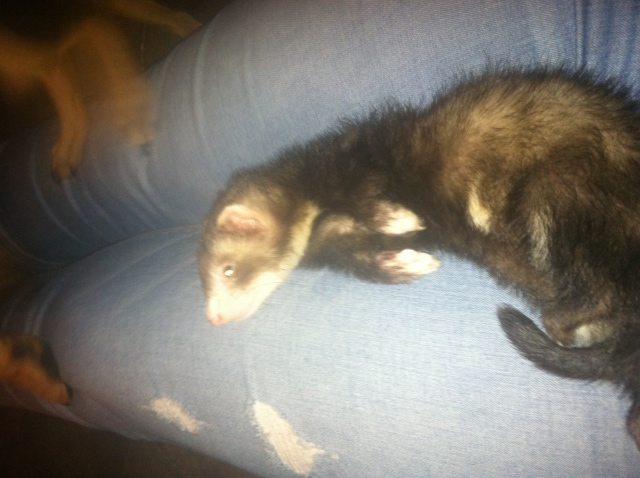 New ferret
Question
Franko the ferret
Hello,
I just boug
New ferret
Question
Franko the ferret
Hello,
I just boug
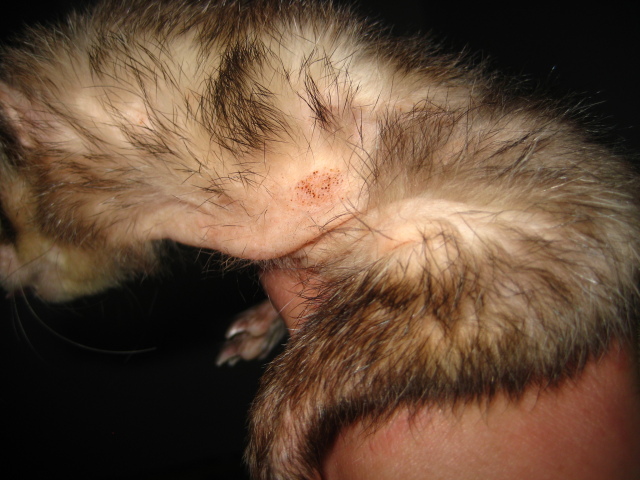 Skin Condition
Question
Chewie
I own 5 ferrets, ranging from 3 to 5. I
Skin Condition
Question
Chewie
I own 5 ferrets, ranging from 3 to 5. I
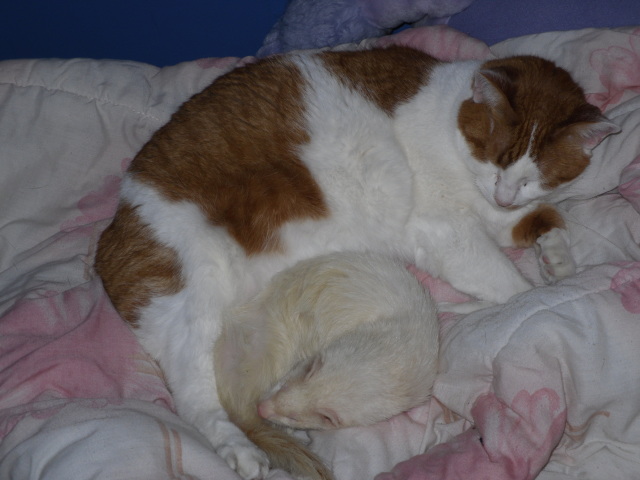 ferrets jaw doesnt open far
Question
Rodney and Harry
I have a 2 year old ferret th
ferrets jaw doesnt open far
Question
Rodney and Harry
I have a 2 year old ferret th
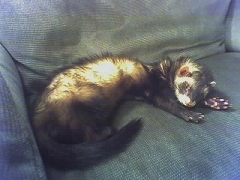 SWOLLEN FEMALE PARTS
QuestionSmokey napping
QUESTION: Hello, I have a
SWOLLEN FEMALE PARTS
QuestionSmokey napping
QUESTION: Hello, I have a
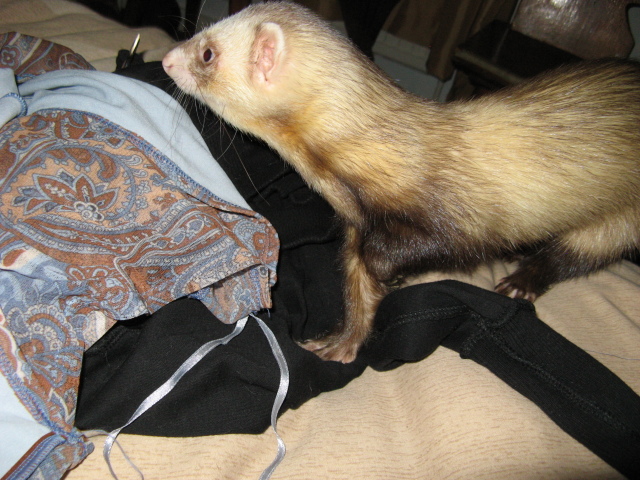 I think my ferret is to thin?
Question
Photo of Ferret
Hi
I think my ferret is to th
I think my ferret is to thin?
Question
Photo of Ferret
Hi
I think my ferret is to th